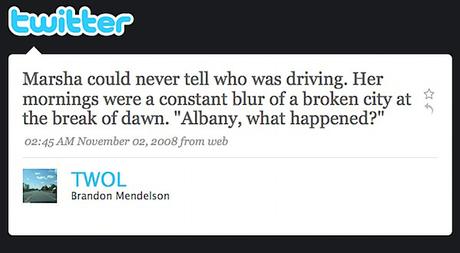 Standard
Standard
I have been born into a generation defined by the rise of the internet and social media culture. In my lifetime I have communicated by text, email, instant message and chat with far more frequency than by face-to-face interaction. This is becoming the story for an incredible number of young people who don't remember a time without Facebook, Instagram, Twitter, let alone (and this last one might shock you) cell phones. This is fundamentally changed the way we communicate, and shifted the focus towards getting a message across in as few words as possible. Sure, you can write a book out of tweets, but it certainly isn't like it used to be.
There was a time when transmitting ideas to a broad audience dispersed around the world required one to put those ideas on paper, print many copies, and then distribute them to the readers. Thoughts, opinions, findings, facts, all carefully scribed or pressed onto the pages of books with the hope that one day they would be read, understood, and eventually used. Everything that was written also needed an fairly deep and relatively broad context, because it was difficult to assume your reader had access to supporting materials that underpinned the ideas in the text. Even personal communication required background as correspondences frequently took several days to exchange.
Now we have the ability to link together sources, as you may often see in my other posts. Instead of explaining all the backstory or even providing evidence for some of my claims in the form of in-text data, I can simply hyperlink my text to some study or website that describes what I can't (or often don't want to for the sake of brevity). With the rapid and constant nature of communication via text message or chat, if you want to know about something that happened previously in someone's life it is easier to scroll back in time than to ask for the story again. Any background you don't already have can most likely be found within their Facebook updates or tweets if you look hard enough.
Books that fall into the non-fiction category, however, are mostly made up of a central idea or ideas surrounded by a myriad of background information, supporting proofs, citations of other knowledge, anecdotes and rhetoric that help argue the author's point. If you were to distill a book down into a tweet, you would simply spell out your conjecture and provide a link to some proof. Instead of asking individuals to pursue lengthy lines of logical reasoning, we are asking for concise, clear facts presented in the shortest amount of time possible.
Twitter's "micro-blogging" format perfectly exemplifies this. You have 140 characters to sum up your thought or opinion, or to attract someone's attention long enough to spell it out somewhere else. This trend of brevity presents itself in a number of other places as well, like the rise of TL;DR (standing for Too Long; Didn't Read), which can be used to indicate a summary of a longer text, or as a ridicule for text that has become too lengthy to warrant the time and energy to read it. It is even showing up on Facebook, with the addition of the "Continue Reading" button that reduces long-form posts to the first paragraph or so to prevent it from overtaking your news feed in a vertical scrolling format. I use the "Read More" tag to keep my posts contained on the front page of my blog. The reduction of long text to tiny snippets is everywhere.
Think about the last time you got a text message that was so long it didn't even fit on the screen of your phone. Chances are you were either having a fairly profound, deep conversation, or the person is a notorious "novel writer" over text. In reality it is probably only a paragraph or so of words, but when you are expecting two or three lines that barely make up 2 sentences then you are probably a little annoyed. For some reason it takes a massive amount of energy to actually scroll through the massive message and it likely extends beyond the limits of your attention span. Yet another pitfall for the Millennials.
If you want to unlock the keys to understanding the changing world today, it is likely that you will begin with the fact that most people have the attention span of around 3 seconds. There are goldfish with memories longer than most people's ability to focus. With Netflix binges being the rare exception to the rule, most people within my generation don't invest more than 30 minutes at a time in any one activity. We simply have too much to do, and not enough time in the day to get it done. If you tell me that I am supposed to add "reading for fun" to my schedule during the school year or the regular work week, I will probably consider you insane.
So, to those in my generation who will go on to write beautiful literary works, likely consumed on the glowing screens of devices around the world, let me apologize. You have overcome an incredible barrier that modern education, popular culture and social media have built up for you. You have devoted massive amounts of time to putting your ideas on paper (whether real or metaphorical), and you are presenting it to the world. Unfortunately, unless it comes in an audiobook, or somehow starts outrageously trending, you may be out of luck. Capturing the attention of our generation has nothing to do with a compelling narrative or beautifully crafted anecdotes. It has everything to do with retweets, shares, comments and likes.
